
A Practical Guide to Comparing Steel Burial Vault Prices
Why Understanding Steel Burial Vault Prices Matters for Your Funeral Home
Steel burial vault prices typically range from $1,295 to $6,000, depending on gauge thickness, finish type, and features. Here's what you need to know:
Basic Steel Vault Pricing:
- 12-gauge painted steel: $1,295 - $2,500
- 10-gauge galvanized steel: $3,000 - $4,500
- 7-gauge premium steel: $4,500 - $6,000
- Stainless steel options: $3,950 - $12,995
Additional Costs to Factor In:
- Installation fees: $100 - $500
- Weekend/overtime surcharges: $300 - $800
- Delivery charges vary by location
- Set-up fees: $385+ (often non-negotiable)
Many cemeteries now require outer burial containers to prevent graves from sinking under the weight of soil and heavy equipment. As one industry source notes: "Many cemeteries require the use of a vault so the grave will not sink in."
Steel vaults offer a middle-ground option between basic concrete liners and premium bronze or copper models. They provide solid protection against moisture and ground pressure while staying more affordable than high-end metal alternatives.
The key factors driving price differences include steel gauge (thickness), protective coatings like galvanization, interior linings, and regional installation costs. Understanding these variables helps you guide families toward the right choice for their budget and protection needs.
As funeral industry professionals, we've worked extensively with funeral home directors navigating steel burial vault prices and equipment decisions for over a decade. Our experience in the mortuary supply industry has shown us how proper planning and supplier relationships can significantly impact your bottom line and service quality.
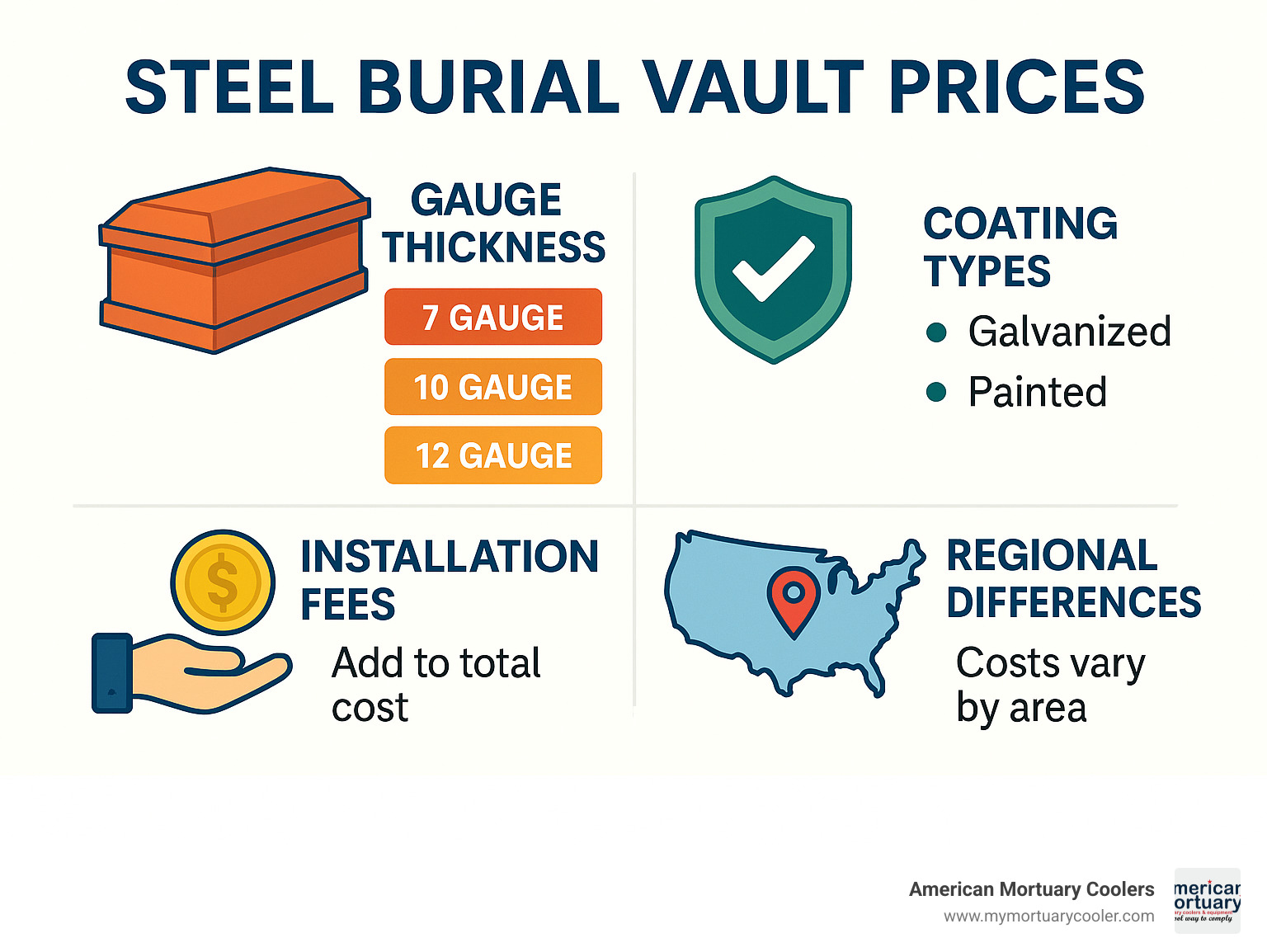
What Drives Steel Burial Vault Prices?
When families ask about steel burial vault prices, they're often surprised by the wide range—from around $1,300 to over $6,000. The difference isn't arbitrary. Several key factors work together to determine the final cost, and understanding these helps you guide families toward the right choice for their needs and budget.
Think of it like buying a car. The base model gets you where you need to go, but upgrades in materials, features, and warranties add up quickly. Steel burial vaults work the same way.
The biggest price driver is steel gauge thickness. This determines how long the vault will protect the casket and maintain the grave's integrity. Next comes the protective coating—basic painted steel costs far less than galvanized or stainless steel options, but the protection levels differ dramatically.
Brand reputation also affects pricing. Established manufacturers like Clark and Wilbert have built their reputations over decades, and that quality assurance comes with premium pricing. Regional factors play a role too—labor costs in major metropolitan areas can be double what you'd pay in smaller communities.
Then there are the extras that many families don't expect: installation fees, delivery charges, and customization options like engraved nameplates or military emblems. These "add-ons" can easily increase the total cost by 30% or more.
Gauge & Durability: Why Thickness Matters
Here's where things get a bit confusing—in the steel world, higher gauge numbers actually mean thinner metal. But for burial vaults, we typically see 12-gauge, 10-gauge, and 7-gauge options, with 7-gauge being the thickest and strongest.
12-gauge steel represents the most common choice, priced between $1,295 and $2,500. It's standard commercial grade thickness that provides solid protection for 15 to 25 years in average soil conditions. Most families find this adequate for their needs without stretching their budget.
10-gauge steel steps up the protection significantly. At 25% thicker than 12-gauge, it typically costs between $3,000 and $4,500 but extends the protection period to 25-40 years. This mid-range option appeals to families who want improved durability without jumping to premium pricing.
7-gauge steel offers the maximum protection in the steel category. With nearly double the metal thickness of 12-gauge, these vaults can last 40+ years and cost between $4,500 and $6,000. They're ideal when families prioritize long-term peace of mind over initial cost savings.
The actual lifespan varies considerably based on soil conditions. Acidic soil, high moisture levels, and salt content can reduce these timeframes by 30-50%. Clay soil tends to be gentler on steel than sandy or rocky conditions.
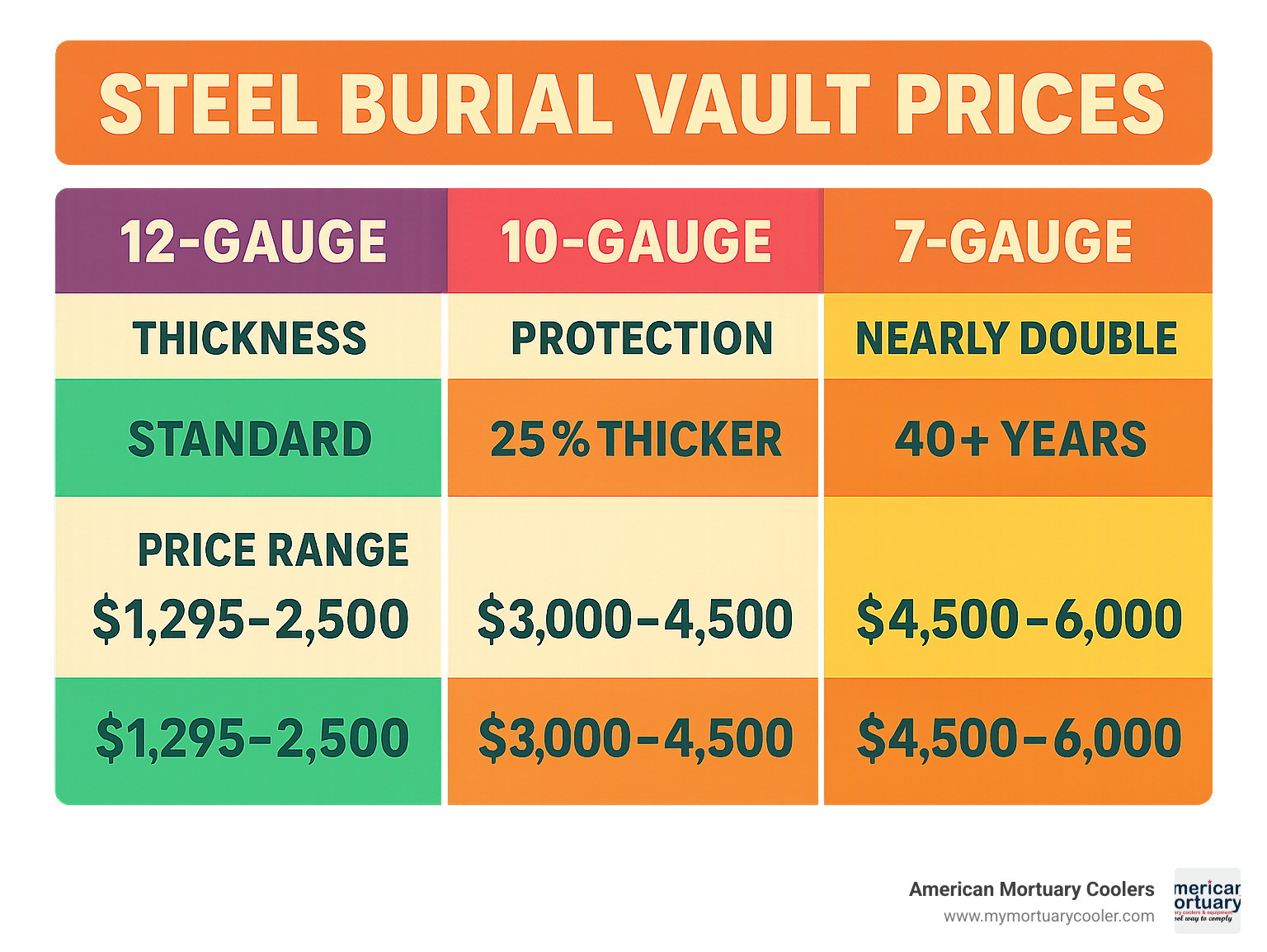
Finish, Coating & Liner Upgrades
The finish on a steel burial vault affects both appearance and longevity—and significantly impacts steel burial vault prices. Think of it as the difference between a basic paint job and premium rust-proofing on a vehicle.
Painted steel finishes represent the entry-level option. A basic painted 12-gauge vault starts around $1,395 and comes in colors like silver wrinkle, white, and bronze. While attractive initially, painted finishes offer limited corrosion protection. They work well in dry climates or when budget constraints are the primary concern.
Galvanized steel coatings provide dramatically better protection through zinc coating. A 12-gauge galvanized painted vault ranges from $2,500 to $3,000, while 10-gauge galvanized options cost $3,695 to $4,500. The premium 7-gauge galvanized vaults can reach $6,000. The zinc coating weight—typically 3.5 to 4 pounds per square foot—determines the protection level.
Stainless steel options represent the top tier for corrosion resistance. Type 304 stainless steel vaults cost between $3,950 and $8,200, weighing approximately 4.51 pounds per square foot. These excel in coastal regions or high-moisture environments where other metals would corrode quickly.
Interior liner upgrades add another layer of protection and visual appeal. ABS plastic liners typically add $200 to $400 to the base price, while Strentex lining upgrades cost an additional $300 to $500. These create an improved moisture barrier and give the interior a more finished appearance.
Location, Setup & Hidden Fees
This is where many families experience sticker shock—the additional fees beyond the vault itself can add 20% to 40% to the total bill. These aren't optional extras; they're necessary services that cemeteries require.
Cemetery set-up fees are typically non-negotiable. The standard industry fee of $385 covers the lowering device, chairs, artificial turf, and tent for the graveside service. Most cemeteries require this regardless of which vault you choose.
Overtime and weekend surcharges can be substantial. Saturday morning services add $500, while Saturday afternoon services cost an extra $800. Services between 3:00 and 4:59 PM add $180, and anything after 5:00 PM costs an additional $300. Sunday and holiday rates can reach $500 or more.
Rural delivery costs affect families outside standard service areas. Most companies include delivery within 50 miles, but beyond that, expect charges of $2 to $5 per mile. Remote locations may require special arrangements that increase costs further.
Chapel and tent services vary by what's included. Basic tent service runs around $300, while premium tents with sides cost $500 or more. Additional chairs beyond the standard number typically cost $5 to $10 each.
Understanding these fees upfront helps families budget accurately and avoid surprises during an already difficult time.
Steel Burial Vault Prices: What to Expect
Based on our extensive work with funeral homes across the contiguous 48 states, here's the realistic pricing landscape for steel burial vault prices in 2025:
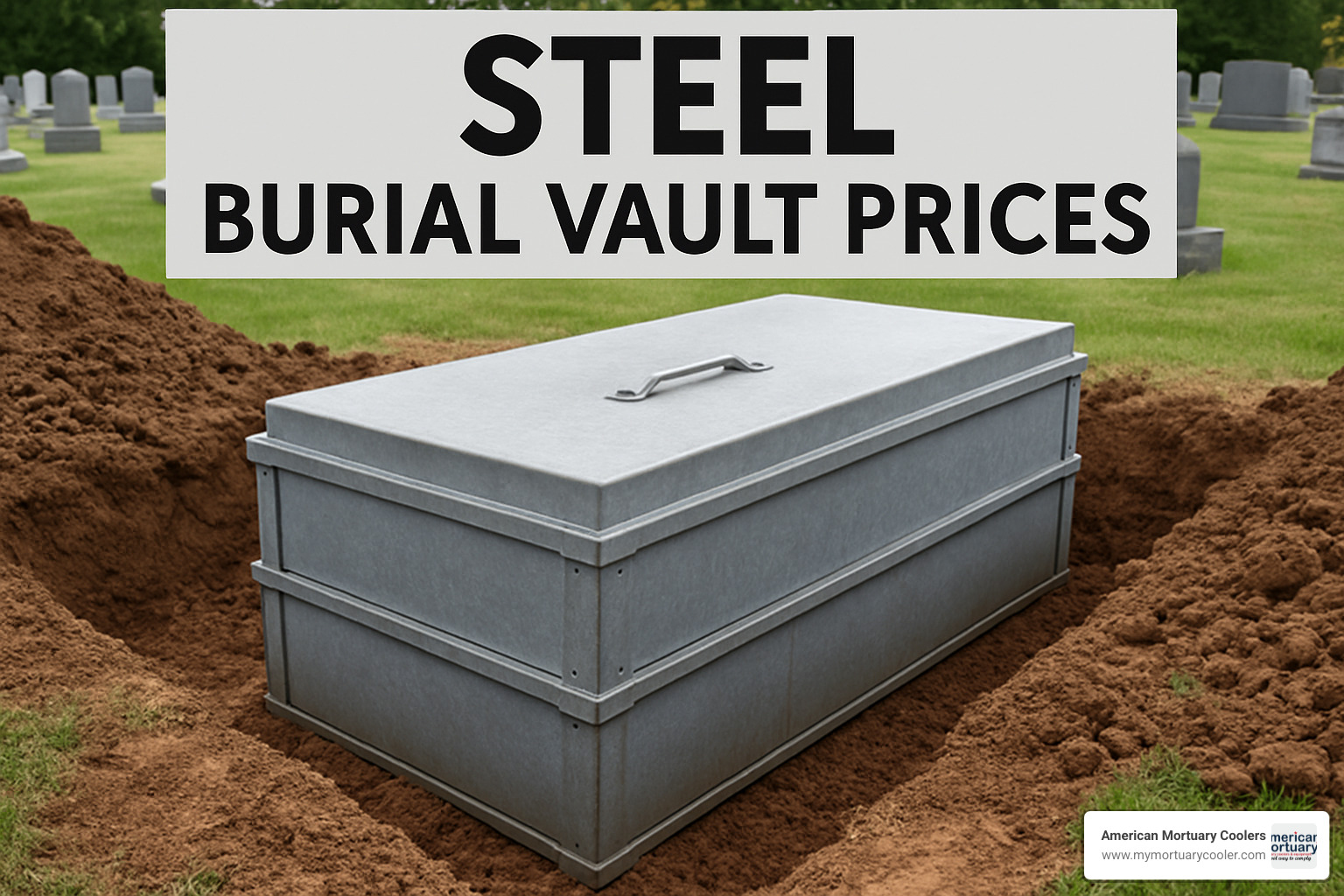
When families walk into your funeral home, they're often surprised by the range of steel burial vault prices. The good news? There's truly an option for every budget and protection need.
Entry-level steel vaults start around $1,295 and go up to $2,000. These 12-gauge painted steel options provide basic moisture protection with a standard 2-year manufacturer warranty. They're perfect for families in dry climates who want reliable protection without breaking the bank.
Mid-range steel vaults fall between $2,000 and $4,000. These 10-12 gauge galvanized steel models offer improved corrosion protection and come with 5-10 year warranties. We've found this range hits the sweet spot for most families - good protection at a reasonable price.
Premium steel vaults range from $4,000 to $6,000. These 7-gauge galvanized or stainless steel options provide maximum protection against the elements with 15-25 year warranties. The durability actually compares well to entry-level bronze options at a lower price point.
Ultra-premium stainless steel vaults can cost $8,000 to $12,995. These Type 304 stainless steel models offer lifetime corrosion resistance with 25+ year warranties. While pricey, they're still competitive with copper alternatives.
One practical consideration we always share with funeral directors: weight matters for cemetery operations. Standard 12-gauge steel vaults weigh 400-600 pounds, while 7-gauge models can exceed 800 pounds. Make sure your cemetery has the right equipment for installation.
For additional perspective on burial vault costs across different materials, this comprehensive burial vault cost guide provides helpful comparisons between steel, concrete, and premium metal options.
Cost & Protection Trade-Offs
When families ask about steel burial vault prices, we've found it helpful to break down the protection-per-dollar value. It's not just about the upfront cost - it's about long-term peace of mind.
Budget steel vaults at $1,295 work out to about $86 per year of expected protection over a 15-year lifespan. Mid-range steel options at $3,500 cost roughly $117 per year over 30 years. Premium steel vaults at $5,500 come to $138 per year over 40 years of protection.
But here's what really matters: your local environment. After working with funeral homes from Tennessee to California, we've seen how location dramatically affects vault performance.
Coastal regions with salt air accelerate corrosion, making stainless steel worth the investment. High-moisture areas need galvanized coatings - it's not optional. Arid climates often do fine with basic painted steel, saving families money.
Clay soils require vaults with improved drainage features, while sandy soils typically work well with standard protection. These environmental factors can affect vault longevity by 30-50%, so location-specific advice is crucial.
Pros & Cons of Choosing Steel
After working with hundreds of funeral homes, we've learned that steel vaults have some real advantages - and a few limitations worth discussing honestly with families.
The strength-to-weight ratio makes steel vaults much easier to handle than concrete alternatives. They're also more affordable than bronze or copper while offering better durability than basic concrete liners. Customization options are excellent - steel takes engraving, paint, and modifications beautifully.
Cemetery acceptance is universal, which eliminates potential complications. Plus, steel has recycling potential at the end of its lifespan, which appeals to environmentally conscious families.
The main limitation? Rust risk without proper coating. Steel will corrode over time, especially in harsh environments. Price volatility can also be challenging - steel commodity prices fluctuate, affecting vault costs.
Some families feel steel lacks the prestige of bronze or copper, and painted surfaces may need touch-ups over time. For families considering green burial alternatives, steel vaults aren't compatible with natural burial grounds, which typically require biodegradable containers or no vault at all.
The bottom line: steel burial vaults offer excellent value for families who want reliable protection without premium pricing. They're the practical choice that delivers on both performance and affordability.
Shopping Smart: Where & How to Buy a Steel Burial Vault
Finding the right supplier for steel burial vault prices can make a significant difference in both cost and service quality. After working with funeral homes across the country, we've seen how the right purchasing strategy can save thousands while ensuring reliable service.
Most families will encounter steel burial vaults through their funeral home's General Price List (GPL). The Federal Funeral Rule requires funeral homes to itemize vault pricing, which typically includes a markup of 50-100% over wholesale cost. While this might seem steep, you're paying for convenience, professional installation, and coordination services that can be invaluable during a difficult time.
Direct-to-consumer online purchasing has become increasingly popular, offering potential savings of 20-40% compared to funeral home pricing. However, these savings often come with trade-offs. You'll need to arrange your own installation, shipping costs can eat into savings, and verifying quality becomes more challenging when you can't see the product firsthand.
For larger funeral operations, manufacturer direct sales through companies like Clark and Wilbert can provide the best value. These relationships work particularly well for bulk purchases and often include professional installation networks with warranty support directly from the manufacturer.
We've helped many funeral homes optimize their vault programs by establishing relationships with multiple suppliers. This approach provides better pricing leverage and service reliability. Volume commitments often yield 10-15% discounts, while annual contracts provide price stability that helps with budgeting. Regional cooperative purchasing can increase your leverage even further, and seasonal ordering helps reduce storage costs.
More info about funeral supply stores provides additional insights into supplier relationships and purchasing strategies that can benefit your operation.
Customization & Personalization Costs
Personalization options add meaningful value for grieving families, though they do impact steel burial vault prices. Understanding these costs helps you guide families toward options that fit their budget and emotional needs.
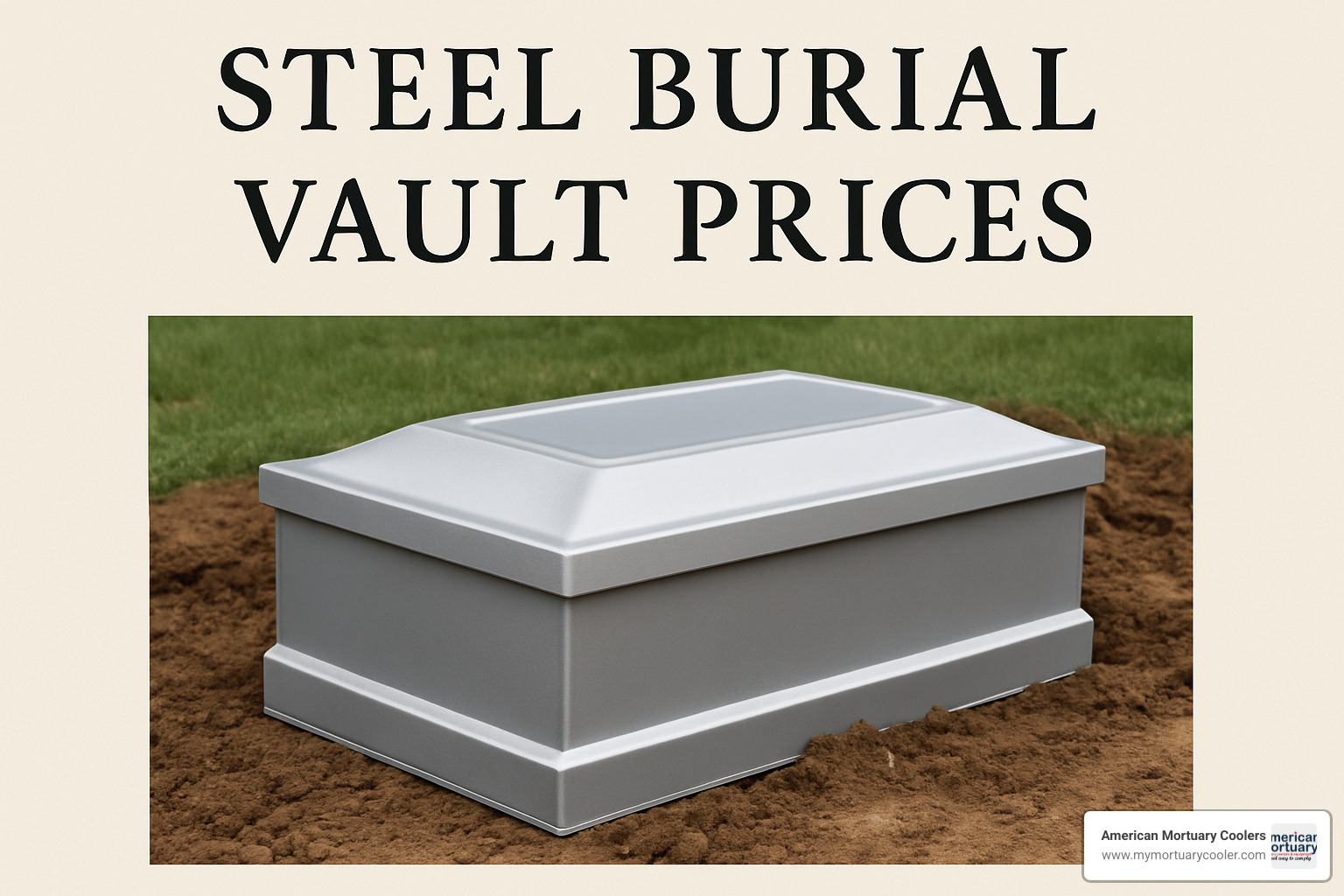
Engraved nameplates represent the most common personalization request. Basic acrylic plates run $12-25, while metal engraved plates cost $50-150 depending on the finish. Gold, silver, and bronze options are typically available, and font choices can affect pricing.
Military and service emblems hold special significance for veteran families. Standard military branch emblems cost $75-200, while custom service unit insignia can run $200-500. Flag holders and accessories add another $25-100, and some manufacturers offer veteran-specific vault models with built-in military themes.
Custom paint work offers another personalization avenue. Standard color options are usually included in the base price, but custom color matching adds $200-500. Decorative themes can cost $300-800, and a clear coat protection finish typically adds $100-200.
Interior lining upgrades provide a finishing touch that families appreciate. Standard white or beige linings come included, but premium fabric linings cost $150-400. Waterproof barrier upgrades add $200-350 and provide additional protection.
In our experience, personalization typically adds 10-25% to the base vault cost, but the emotional value and family satisfaction make these upgrades worthwhile investments.
Money-Saving Alternatives
For families concerned about steel burial vault prices, several alternatives can reduce costs while still meeting cemetery requirements and providing appropriate protection.
Basic steel grave liners offer the most straightforward savings approach. At around $1,295 compared to $2,500+ for sealed vaults, they meet minimum cemetery requirements while providing basic protection. However, they offer limited moisture protection and don't include sealing mechanisms.
Rental casket programs can dramatically reduce overall funeral costs. Families rent a premium casket for the service, then transfer to a simple container for burial. This approach can reduce total funeral costs by $2,000-5,000, though you'll still need the steel vault for burial.
VA benefits provide significant value for veteran families. Veterans Administration cemeteries provide basic concrete liners free of charge, while private cemetery burials qualify for burial allowances up to $796. Veteran-specific vault models are often discounted, and military funeral honors come included.
Weekday service scheduling avoids costly weekend surcharges of $500-800. You'll also face reduced overtime fees, have better availability of preferred vaults, and may qualify for vendor discounts during off-peak times.
Pre-planning with price locks protects against future increases in steel burial vault prices. You can lock in current pricing, avoid inflation over time, and often access payment plan options. This approach also reduces stress for families during their time of grief, allowing them to focus on healing rather than financial decisions.
Frequently Asked Questions about Steel Burial Vault Prices
Do all cemeteries require a steel burial vault?
Here's something that surprises many families: not all cemeteries require steel specifically, but the vast majority do require some form of outer burial container. After working with funeral homes across the country, we've seen how these requirements vary quite a bit.
Municipal cemeteries typically have the most flexible rules, often accepting basic grave liners as their minimum requirement. Private cemeteries, on the other hand, frequently mandate sealed vaults because they want to maintain that pristine appearance of their grounds over time.
Religious cemeteries can be all over the map depending on their denomination and local customs. We've worked with some that have very specific requirements, while others are surprisingly flexible.
If you're considering a green burial, you'll want to look elsewhere entirely. Green burial grounds typically prohibit all vaults since the whole point is natural decomposition. And here's a nice benefit for our veterans: VA cemeteries actually provide a basic concrete liner at no charge.
Our strongest recommendation? Always contact the specific cemetery directly before making any vault purchase. We've seen situations where requirements varied between different sections of the same cemetery, so it's worth that phone call to avoid any surprises.
What warranties come with steel vaults?
Steel burial vault warranties can be a bit confusing, but understanding them helps you make smarter decisions about steel burial vault prices and long-term value.
Basic painted steel vaults typically come with 2-5 year warranties against manufacturing defects. Galvanized steel options usually offer 10-15 years of protection against corrosion, while stainless steel models often provide 25 years to lifetime coverage against rust.
Most warranties cover manufacturing defects in materials, premature corrosion under normal soil conditions, structural integrity failures, and sealing mechanism problems. What they don't usually cover includes damage from cemetery equipment, normal environmental wear, cosmetic issues that don't affect function, or damage from ground shifting.
Here's an important detail that catches some people off guard: funeral homes typically don't warranty the vaults themselves. They pass that responsibility directly to the manufacturer. So if you ever need warranty service, you'll be dealing with companies like Clark or Wilbert directly, not your funeral home.
Always ask for warranty documentation in writing, and keep it with your important papers. The peace of mind is worth having those details clearly spelled out.
Can I supply my own vault instead of buying through a funeral home?
Absolutely! Federal law specifically protects your right to purchase your own vault, and funeral homes cannot legally prevent you from doing so. The Funeral Rule is pretty clear about this.
Funeral homes cannot charge you handling fees for bringing in an outside vault, they must accept any vault that meets cemetery requirements, they cannot require specific brands, and they must provide the same quality service regardless of where you bought your vault.
That said, there are some practical considerations to think through. You'll need to coordinate delivery timing perfectly, figure out who's responsible for installation and any potential problems, handle warranty service coordination yourself, and verify the quality on your own.
From a cost perspective, direct purchase can save you 20-40% on steel burial vault prices. But don't forget to factor in shipping costs (which can be substantial for heavy steel vaults), potentially higher installation fees, and the loss of any bundled service discounts.
Our honest recommendation? Do the math on total costs including all delivery, installation, and coordination fees. Sometimes the convenience and bundled pricing through your funeral home actually comes out better than going it alone. But for families looking to manage costs carefully, buying direct can offer real savings if you're willing to handle the extra coordination.
Conclusion & Next Steps
Navigating steel burial vault prices doesn't have to feel overwhelming when you understand what drives the costs. From our years working with funeral homes from Tennessee to California, we've seen how the right approach to vault selection can make all the difference for both families and funeral professionals.
The key factors we've covered - steel gauge thickness, protective coatings, regional installation fees, and customization options - all play important roles in determining final costs. But beyond the numbers, successful funeral homes focus on helping families understand the value they're receiving for their investment.
Building strong supplier relationships has proven essential for our funeral home partners. When you work with reliable vault suppliers, you get consistent pricing, quality products, and the support needed to serve families well. This stability becomes especially valuable when families are making difficult decisions during emotional times.
Transparent pricing builds trust with families and reduces those uncomfortable surprises that nobody wants. When families understand why a 7-gauge galvanized vault costs more than basic painted steel, they can make informed decisions that fit their needs and budget.
At American Mortuary Coolers, we've learned that every piece of equipment in the funeral industry - from our custom mortuary coolers to the burial vaults families choose - contributes to the quality and dignity of the services you provide. While we specialize in keeping things properly preserved and cooled, we recognize how all these elements work together.
Your next steps should include comparing quotes from multiple suppliers in your area and confirming specific cemetery requirements before making recommendations to families. Consider developing pre-need vault programs that help families plan ahead and lock in current pricing. This approach reduces stress for everyone involved.
For funeral homes looking to expand their knowledge of related products, our guide on Cremation urns and vaults 101: Key differences explained offers valuable insights into the growing cremation market and how it affects your service offerings.
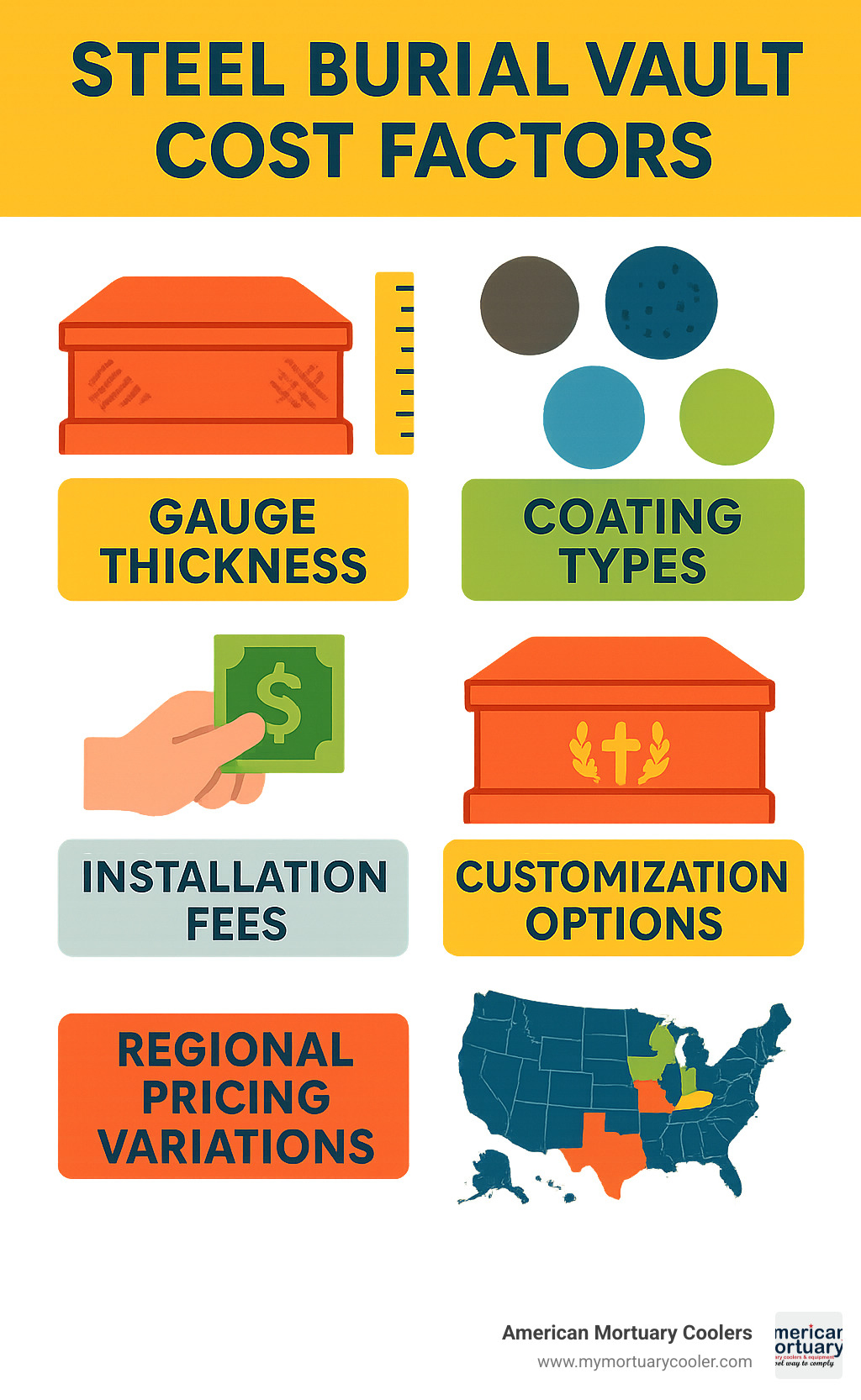
The funeral industry keeps changing, but families will always need quality, affordable burial vault options. When you understand steel burial vault prices and can explain them clearly, you're better equipped to serve families while building a sustainable business.
Whether you're near our Johnson City headquarters or serving families across the country, the fundamentals remain the same: quality products, fair pricing, and genuine care for the families you serve. We're here to support your equipment needs as you continue providing the dignity and service families deserve during their most difficult times.



